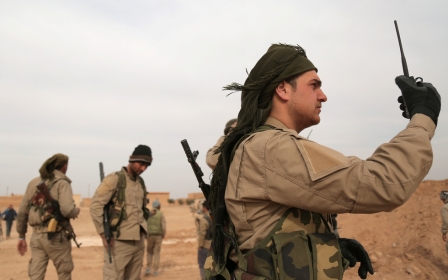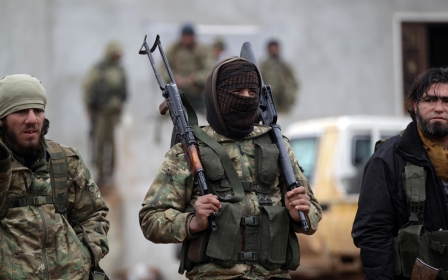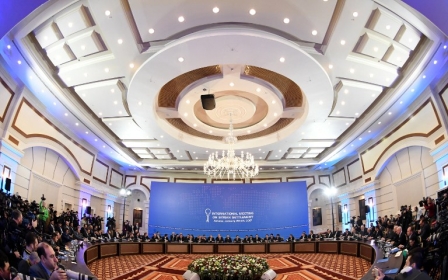Key powers push Syria truce as second Astana talks stall
Syrian government and rebel representatives failed on Thursday to make any breakthroughs at talks in Kazakhstan, as key powerbrokers Russia, Turkey and Iran sought to shore up a shaky ceasefire.
The meeting was the second time key players Moscow, Tehran and Ankara have brought the warring sides to the Kazakh capital of Astana, and comes before a new round of UN-led talks on Syria in Geneva on 23 February.
But the government delegation and rebels again did not hold one-on-one talks and no joint statement was agreed after a final 40-minute meeting involving all the parties.
Instead, President Bashar al-Assad's allies, Russia and Iran, and rebel supporter Turkey followed up an earlier pledge by agreeing to set up a joint monitoring group to try to ensure a fragile six-week truce.
"The question of observing the ceasefire is being solved and we are hopeful to solve political questions too," said Russian mediator Alexander Lavrentiev.
Lead rebel negotiator Mohammad Alloush said that the meeting "didn't achieve anything practical" but claimed the armed opposition received several pledges from Moscow.
Russia promised to stop shelling opposition areas and to help push for the release of political prisoners, he said, as well as to send a "schedule" for the end of a government seige around Eastern Ghouta near Damascus.
Russia has billed talks in Astana as a prelude to Geneva, despite speculation that it was trying to sideline the West with the latest initiative.
"The Astana meeting has paved the way for the next Geneva conference," lead Syrian government negotiator Bashar al-Jaafari said, blaming Turkey and rebels it backs for the failure to produce a final statement.
'Time to step up efforts'
Iranian deputy foreign minister Hossein Jaberi Ansari said that the sides were at "the beginning of a difficult road".
Ansari, who led his country's delegation, said the sides would meet again in "less than a month" in either Astana, Moscow, Tehran or Ankara.
A first set of talks in Astana in January saw the rebels refuse to talk directly to the government and did not result in a significant breakthrough.
Before the latest round began, UN envoy Staffan de Mistura was in Moscow for talks with Russia's foreign and defence ministers, Sergei Lavrov and Sergei Shoigu.
"Now is the right time to step up efforts to normalise the political process in Syria," de Mistura told Lavrov in comments translated into Russian by the state-run TASS news agency.
In Damascus, Assad told French media on Thursday that his goal was to retake "every inch of Syrian territory".
'Goodwill' gestures
A convoy set to deliver aid to the besieged Syrian area of Waer should be cleared by Damascus as a "goodwill" gesture ahead of peace talks in Geneva next week, the UN said on Thursday.
Trucks were scheduled to go to Waer on Friday after receiving initial government approval, said Jan Egeland, the head of the UN-backed humanitarian taskforce for Syria.
But convoys have repeatedly been blocked at last minute by military or administrative obstacles.
Egeland said the convoy "will be very important as a sign of goodwill as political negotiations are scheduled in Geneva".
Waer is the last remaining opposition stronghold in the central province of Homs.
Rebel groups also regularly block convoys to areas they have under siege.
Egeland raised alarm over starvation in what has become known as the "four towns", a group that includes government-controlled Fuaa and Kafraya in northwestern Idlib as well as Zabadani and Madaya, two rebel-held towns near Damascus.
An deal to allow aid into the towns has largely stopped functioning, according to the UN.
"If we are not reaching the four towns... very soon we will see the scenes that we saw when the (humanitarian taskforce) started a year ago: people starving", Egeland said.
There are 80 people in the four towns in need of urgent medical evacuation, he added.
No Russia-US intel sharing
Also on Thursday, top US and Russian military leaders agreed at a meeting in Azerbaijan to enhance communication to avoid "unintended incidents" the US defence department said, in an apparent attempt to avoid encounters in the skies over Syria.
The US and Russia already agreed in 2015 to create a ground communication link.
"The leaders further agreed to enhance communications on such stabilising measures," the US military said after the meeting between Joseph Dunford, the chairman of the Joint Chiefs of Staff, and the head of the Russian general staff, Valery Gerasimov. While the statement did not specifically refer to Syria, it mentioned that efforts have been taken to improve operational safety and avoid accidents.
The US however ruled out fuller military collaboration with Russia, in a blow to Moscow's hopes to mend ties with Washington after Donald Trump's election.
New MEE newsletter: Jerusalem Dispatch
Sign up to get the latest insights and analysis on Israel-Palestine, alongside Turkey Unpacked and other MEE newsletters
Middle East Eye delivers independent and unrivalled coverage and analysis of the Middle East, North Africa and beyond. To learn more about republishing this content and the associated fees, please fill out this form. More about MEE can be found here.




